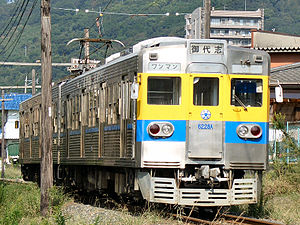Kumamoto Electric Railway
| Kumamoto Electric Railway | |||
|---|---|---|---|
 | |||
 A 6000 series train | |||
| Overview | |||
| Status | Operational | ||
| Owner | Kumamoto Electric Railway | ||
| Locale | Kumamoto Prefecture | ||
| History | |||
| Opened | 15 August 1909 | ||
| Technical | |||
| Line length | 13.1 km (8.1 mi) | ||
| Track gauge | 1,067 mm (3 ft 6 in) | ||
| Electrification | 600 V DC overhead catenary | ||
| Operating speed | 50 km/h (30 mph)[1] | ||
| |||
The Kumamoto Electric Railway (熊本電気鉄道, Kumamoto Denki Tetsudō) is a public transport company in Kumamoto Prefecture, Japan. It is abbreviated as Kumamoto Dentetsu (熊本電鉄) or Kumaden (熊電). The company was founded in 1909. The company operates railway and bus lines.
Lines
- Kikuchi Line (菊池線)
- Kami-Kumamoto — Miyoshi: 10.8 km (6.7 mi)
- Fujisaki Line (藤崎線)
- Kita-Kumamoto — Fujisakigū-mae: 2.3 km (1.4 mi)
A short section of the Fujisaki Line shares its track with public road, like a tram line.
Rolling stock
- 200 series EMU (former Nankai 22000 series)
- 5000 series EMUs (former Tokyu 5000 series)
- 6000 series 2-car EMUs (former Toei 6000 series)
- 01 series 2-car EMUs (former Tokyo Metro 01 series, since March 2015)[2]
- 03 series EMUs (former Tokyo Metro 03 series) since May 2019.
-
A 01 series train in May 2015
Three former Tokyo Metro 03 series EMU trains are scheduled to be purchased and introduced on the line between 2018 and 2020.[3]
History
The forerunner of the company, Kikuchi Tramway (菊池軌道), was established in on 15 August 1909, and opened the 914 mm (3 ft) gauge steam-hauled line from Ikeda Station (池田駅) (close to the present-day Kami-Kumamoto Station) to Sendanbatamachi Station (千反畑町駅) (present-day Fujisakigū-mae Station) on 1 October 1911.[1] On 27 August 1913, the line between Ikeda and Waifu Station (隈府駅) (later named Kikuchi) was opened.[1]
From 31 August 1923, the line was converted to 1,067 mm (3 ft 6 in) gauge and electrified at 600 V DC.[1]
The current section of the Kikuchi Line between Kita-Kumamoto and Kami-Kumamoto opened on 1 October 1950, resulting in two lines between those stations, the original via Fujisakigū-mae and the new line.[1] In June 1953 the original line from Kami-Kumamoto to Fujisakigū-mae closed.[1] The 13.5 km Miyoshi to Kikuchi section closed on 16 February 1986 due to falling patronage.[1]
See also
References
- ^ a b c d e f g Terada, Hirokazu (19 January 2013). データブック日本の私鉄: 全国私鉄165社局掲載 データブック日本の私鉄 [Databook: Japan's Private Railways]. Japan: Neko Publishing. p. 186. ISBN 978-4-7770-1336-4.
- ^ Kekke, Manabu (June 2015). 熊本電気鉄道01形 [Kumamoto Electric Railway 01 series]. Tetsudō Daiya Jōhō Magazine (in Japanese). Vol. 44, no. 374. Japan: Kotsu Shimbun. pp. 44–47.
- ^ 中古車両、熊本電鉄で「第二の人生」5車種すべて移籍組 東京メトロの3編成導入へ [Old rolling stock to spend new life, 5 different types already transferred, 3 Tokyo Metro trains to be introduced] (in Japanese). Japan: Nishinippon Shimbun. 15 January 2018. Archived from the original on 16 January 2018. Retrieved 16 January 2018.
External links
- Official website (in Japanese)

